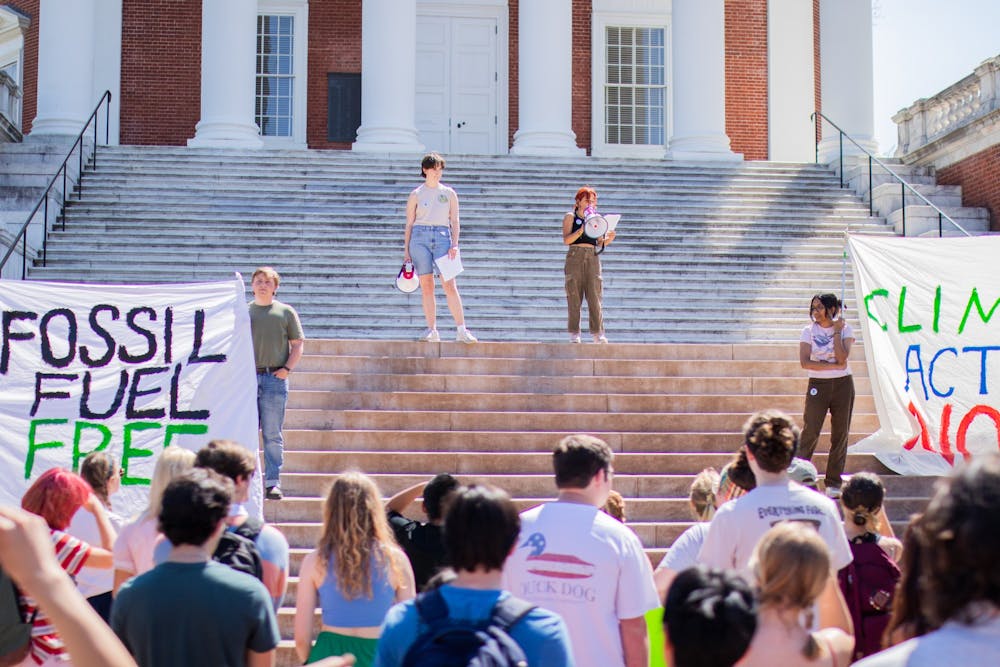In honor of Earth Day, over 100 protestors gathered on the steps of the Rotunda for a march organized by DivestUVA calling for the University to divest all financial support of the fossil fuel industry by the end of this year.
Fossil fuels — which include coal, oil and natural gas — are non-renewable energy sources that contribute to global climate change by releasing greenhouse gasses into the atmosphere. In 2021, greenhouse gas emissions rose by 6.2 percent from 2020, which included a 17 percent spike in coal generation — the highest spike since 2014.
DivestUVA was founded in 2015 as a coalition of individuals and student groups advocating for climate justice and fossil fuel divestment. Core organizations that are members of the coalition include the Young Democratic Socialists of America Ecosocialists, University Democrats, Outdoors Club, and the Environmental Justice Collective.
During the event, students shared original speeches and poems regarding climate justice and respect for nature. One student sang the traditional Spanish song “De Colores” as a celebration of the Earth. DivestUVA also shared with the crowd a list of nine demands directed at both University leadership and the University Investment Management Company.
UVIMCO oversees the investment and fund allocation of the University’s $14.5 billion endowment. The group provides investment management services and thus has a direct role in determining the companies the endowment is invested in.
During the event, DivestUVA organizers called for the release of a more detailed net-zero plan by the University, which would outline steps to cut greenhouse gasses and ensure that any emissions by the University or its investments will be offset through other activities or investments. UVIMCO, however, already committed to releasing a detailed plan in 2022 explaining short-term and long-term climate goals for investment.
Maanasi Gupta, DivestUVA organizer and second-year Batten student, believes that UVIMCO has not made sufficient progress in its divestment efforts.
“UVIMCO has partially acted on some of our demands.” Gupta said. “They still haven’t fully divested, and I think that’s the biggest thing.”
While UVIMCO has not committed to full divestment in line with DivestUVA’s demands, UVIMCO’s net-zero strategy includes a net-zero goal for both direct and indirect investments, and it aligns with the University’s sustainability goal of net-zero emissions by 2050.
UVIMCO plans to follow through on the University’s sustainability goal of achieving net-zero carbon emissions by 2030 and fossil fuel-free by 2050 through measures such as avoiding direct investments in fossil fuel companies and allocating capital to support technologies and services dedicated to reducing emissions.
Maile Bowerman, DivestUVA organizer and second-year Architecture student, echoed Gupta’s sentiments, saying that while the UVIMCO framework is a step in the right direction, the actions outlined in the framework are not enough.
“We appreciate that they did hear our concerns and try to incorporate them into a more sustainable framework,” Bowerman said. “But we still believe that that framework, the investment principles [are] not enough to really realize the principles of environmental justice at U.Va., and we're just going to continue lobbying and advocating for those changes.”
Several speakers expressed concerns about the Board of Visitors’ ties to Dominion Energy, highlighting DivestUVA’s demand for the University to remove the influence of fossil fuel companies from University administration. Currently, Robert Blue, chief executive officer of Dominion Energy, and Carlos Brown, senior vice president of Dominion Energy, serve as members of the University’s Board of Visitors.
Other demands include bringing building standards up to the “highest practicable” energy efficiency standards, calling on the University to demand that Charlottesville’s City Council adopts a Climate Action Plan, commissioning an environmental justice report to document the impacts of “waste, energy production, and built environments” on communities of color and increasing sustainable transportation options in Charlottesville.
During the event, DivestUVA organizers led protestors up University Ave until the group arrived at the site where the George Rogers Clark statue sat until it was removed last summer. The site sits in the shadow of the U.Va. Heat Plant, which burns coal, oil and natural gas as an energy source for University-operated buildings.
Aayusha Khanal, DivestUVA organizer and second-year Batten student, said protestors gathering near tha plant is symbolic because the plant serves as a physical reminder of the University’s reliance on coal, oil and natural gas.
“We wanted to show that fossil fuel divestment is not the only environmental injustice that the University commits,” Khanal said. “[The plant] also is burning coal, it's burning natural gas and oil. We want to show that [the University] can no longer be complicit.”
The plant supplies energy to 164 buildings, including U.Va Health System buildings, student dormitories and the Rotunda. The heat plant where rally attendees gathered Friday is one of three main heat plants at the University — with two additional facilities providing heat to John Paul Jones Arena and North Grounds — and stores upwards of 4,500 tons of coal.
These concerns were also shared by the larger community, and activists from local groups in the Charlottesville area participated in the rally, such as Artivism, an organization that engages in environmental activism such as messaging and events through artistic mediums, and the Charlottesville Democrats.
“What happens at this University, the pollution that we create, affects the greater Charlottesville community,” Gupta said. “It’s really important for us as students not to just be stuck in this vacuum and only concerned about U.Va. issues because they do affect the community at large.”
Given that community members also experience the effects of the University’s emissions, Khanal recognizes community members as allies in environmental justice initiatives.
“We want to acknowledge that community members are vital in our fight for environmental justice at U.Va. and in Charlottesville,” Khanal said. “And that's why we think it's so important to have them not just be included, but have them be collaborative members of our fight for environmental justice.”





